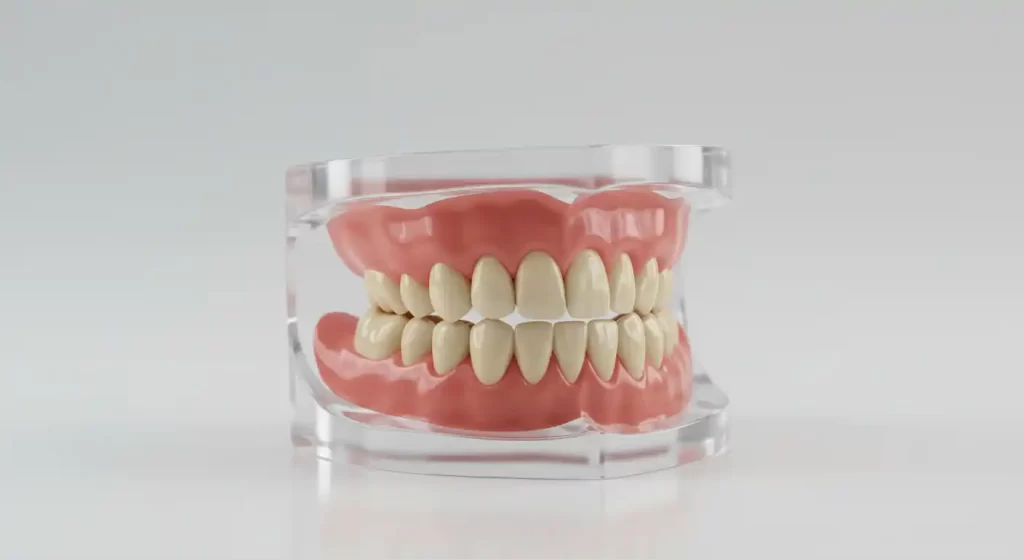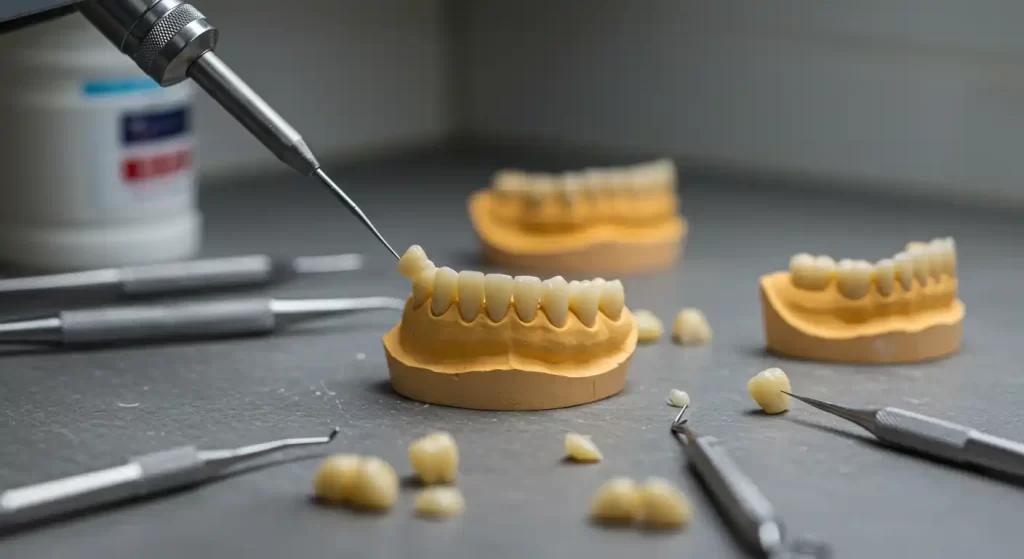Prosthetic teeth are artificial replacements placed in the mouth to restore missing teeth. This treatment method provides both aesthetic improvement and functional recovery. It allows compensation for congenitally missing teeth, tooth loss due to trauma, or age-related tooth deficiencies. It enhances chewing ability and may reduce speech difficulties as well.
Prosthetic teeth treatment options are generally categorized into two main types: fixed and removable. Fixed prostheses are applied using bridges or implant-supported crowns. Removable ones are designed to be inserted and removed by the patient. The appropriate prosthesis type depends on the individual’s oral anatomy, number of missing teeth, and overall health. With proper planning, these solutions can offer results that closely resemble natural teeth.
Dental Prosthesis
Dental prosthesis applications aim to replace teeth lost due to various reasons with artificial ones. This treatment method not only improves aesthetic appearance but also restores chewing function.
Today’s dental prostheses offer a highly natural appearance both visually and structurally thanks to technological advances. This is particularly beneficial for individuals with tooth loss, providing positive results both in terms of health and psychological well-being.
Different types of dental prostheses can be applied in various ways. Factors such as the individual’s needs and oral anatomy play a decisive role in determining the appropriate treatment. The most commonly used types of dental prostheses in treatment include:
- A natural appearance can be achieved with fixed prosthetic teeth.
- Removable prostheses are usually designed to be easily inserted and removed.
- Implant-supported prostheses are fixed onto implants placed in the jawbone.
- Total prostheses are preferred in cases of complete tooth loss.
- There are also models produced with metal reinforcement or entirely from acrylic material.
Prosthetic applications are important not only for aesthetic purposes but also for maintaining oral health.
Using prostheses without proper planning may lead to issues such as irritation or incompatibility in the gum tissue. Therefore, the design and application process of the prosthesis must be carried out by qualified dentists. When prostheses are tailored to fit the oral structure properly, they form a natural harmony with the teeth. This ensures long-term comfort. With proper maintenance, these prostheses can be used reliably for many years.
What Is a Prosthetic Tooth?
The question “What is a prosthetic tooth?” is frequently asked by individuals who have experienced tooth loss.
Artificial dental solutions are applied to ensure both aesthetic and functional integrity within the mouth. These prostheses are made using various materials and techniques. They are placed in place of missing teeth and play a key role in meeting chewing, speech, and aesthetic expectations. At the same time, they help maintain oral health by preserving jawbone structure.
The advantages of prosthetic tooth applications include:
- Resolving aesthetic issues caused by tooth loss and boosting self-confidence.
- Improving chewing and speech functions, thus enhancing social life quality.
- Preventing the drifting of healthy neighboring teeth by replacing missing ones.
- Balancing pressure and trauma on the gum tissue, protecting surrounding soft tissues.
- Supporting facial features and preventing collapse caused by aging.
- Modern dentures closely resemble natural teeth.
- Distributing intraoral pressure evenly and reducing the risk of joint problems.
- Often requiring no surgical intervention during the treatment process.
These prostheses are produced using durable and biocompatible materials. In particular, acrylic material is often preferred due to its cost-effectiveness and adaptability. Proper application and oral compatibility of prostheses are crucial for long-term use. Regular follow-ups and adjustments performed by dentists can help prevent potential problems.

Prosthetic Tooth Prices
Prosthetic tooth prices vary depending on the method applied, the material used, and the patient’s oral structure or need for additional treatment. Since every individual has unique dental anatomy and treatment needs, a fixed pricing model is not realistic. However, factors such as the type of prosthesis, the complexity of the procedure, the dentist’s experience, and the clinic’s facilities significantly affect the cost.
Individuals with tooth loss often experience both functional and aesthetic difficulties. Removable prostheses are generally among the more affordable options. However, for long-term durability and comfort, implant-supported prostheses offer more advantages. These prostheses are anchored to implants placed in the jawbone, offering high stability and a natural tooth appearance.
Material quality also plays a role in determining treatment costs. Patients with high aesthetic expectations may prefer porcelain over acrylic material, which directly influences the total price. In addition, the compatibility of prostheses with the mouth and their lifespan significantly affect the long-term value of treatment.
For accurate pricing, an in-person examination is essential. Afterward, a treatment plan created by dentists can match the patient’s expectations and budget while offering an appropriate and sustainable solution.
Non-Palatal Dental Prosthesis
Non-palatal dental prosthesis is a specially designed type of prosthesis developed for individuals who are uncomfortable with contact on the upper palate. Unlike traditional total prostheses, these do not fully cover the palate but rather sit on the gums, leaving the rear soft tissue exposed. As a result, the patient’s sense of taste is preserved, and speech is less affected by gag reflex or blockage.
This type of prosthesis is often categorized under removable prostheses, yet certain models may be implant-supported, offering enhanced stability and comfort. From a dental health perspective, its design increases airflow, reduces moisture accumulation, and thus minimizes the risk of fungal or bacterial growth beneath the prosthesis. Additionally, its lightweight structure ensures a quicker adaptation process.
With the help of modern technology, these prostheses are produced using biocompatible and aesthetically superior acrylic material, achieving a natural harmony with the teeth. They also remain less noticeable during speech or smiling.
In the prosthesis selection process, patient expectations and oral structure should be carefully evaluated by the dentist. Non-palatal prostheses are ideal for those who have lost teeth but are sensitive to palate pressure and are among today’s most preferred prostheses due to their aesthetic and functional success.
You can contact Elşen Yusufoğlu clinic to get information about prosthetic teeth and prosthetic dental treatment methods.

